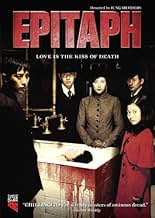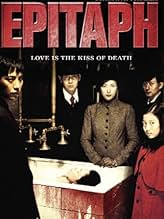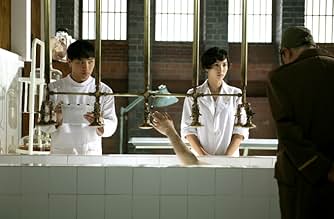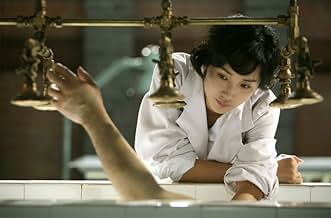AVALIAÇÃO DA IMDb
6,2/10
1,3 mil
SUA AVALIAÇÃO
Adicionar um enredo no seu idiomaA series of horrifying events plague a Korean hospital in the 1940s.A series of horrifying events plague a Korean hospital in the 1940s.A series of horrifying events plague a Korean hospital in the 1940s.
- Direção
- Roteiristas
- Artistas
- Prêmios
- 5 vitórias e 6 indicações no total
- Direção
- Roteiristas
- Elenco e equipe completos
- Produção, bilheteria e muito mais no IMDbPro
Avaliações em destaque
A traumatized girl sees visions of her dead mother in one of three tales set in a 1942 South Korean hospital.
My thoughts: Epitaph stands out as a Korean horror film that trades jump scares for a lingering sense of dread. The story drifts between characters and timelines, sometimes feeling disjointed at first, but it eventually ties everything together in a way that pays off if you stick with it. Each segment taps into ghost stories that explore grief, regret, and the scars of the past, turning supernatural moments into something poetic rather than just frightening.
Visually, this film is something to see. The shadowy hospital corridors and period details pull you into its unnerving atmosphere. Instead of quick scares, the camera settles on images and movement that slowly build tension, making you feel uneasy without having to shout for your attention. This is definitely a slow-burner, so if you're after constant action, it might test your patience, but the payoff is how immersive and memorable the world feels.
What really makes Epitaph memorable is the way it uses its anthology format to show how the living and the dead remain connected. The ghosts here act as reflections of loss and unresolved pain rather than standard threats, and the historical setting adds an extra layer of mood and meaning without ever dragging the story down. If you want atmospheric, reflective horror with real substance, especially if you're a fan of the director's later work on Gonjiam: Haunted Asylum, this one is absolutely worth checking out.
Review written by artist jayakumar jrain.
My thoughts: Epitaph stands out as a Korean horror film that trades jump scares for a lingering sense of dread. The story drifts between characters and timelines, sometimes feeling disjointed at first, but it eventually ties everything together in a way that pays off if you stick with it. Each segment taps into ghost stories that explore grief, regret, and the scars of the past, turning supernatural moments into something poetic rather than just frightening.
Visually, this film is something to see. The shadowy hospital corridors and period details pull you into its unnerving atmosphere. Instead of quick scares, the camera settles on images and movement that slowly build tension, making you feel uneasy without having to shout for your attention. This is definitely a slow-burner, so if you're after constant action, it might test your patience, but the payoff is how immersive and memorable the world feels.
What really makes Epitaph memorable is the way it uses its anthology format to show how the living and the dead remain connected. The ghosts here act as reflections of loss and unresolved pain rather than standard threats, and the historical setting adds an extra layer of mood and meaning without ever dragging the story down. If you want atmospheric, reflective horror with real substance, especially if you're a fan of the director's later work on Gonjiam: Haunted Asylum, this one is absolutely worth checking out.
Review written by artist jayakumar jrain.
...But if you do watch it anyway, you won't be disappointed. Just don't expect an all-out horror film; there's lots of drama and love story in this one too. Yes, the story is a little jumbled because of its non-linearity, but if you have the patience, this movie is worth it.
Parts of this film reminded me of The Cell, which is not a bad thing at all. The surrealistic imagery is successful, and even though it was hard to follow, the stories were entertaining.
In conclusion, this movie requires patience, and it is a little hard to follow, but if you keep with it, the interesting story elements will entertain you.
7 from me.
Parts of this film reminded me of The Cell, which is not a bad thing at all. The surrealistic imagery is successful, and even though it was hard to follow, the stories were entertaining.
In conclusion, this movie requires patience, and it is a little hard to follow, but if you keep with it, the interesting story elements will entertain you.
7 from me.
Epitaph is a horror film from South Corea. While you could definitely call it an anthology, as it contains three separate stories, all the stories are set in the same place and time, a hospital in Seoul during the Japanese occupation. While, I have to admit that the film is remarkably photographed and has great art, design and production values, and it even manages to be far more coherent and interesting that most horror films, it falls short of its potential when it comes to the stories presented.
The first story deals with a young intern, a ward of the hospital director, who becomes mesmerized by a beautiful new corpse that arrives. This is perhaps the least traditional story and the one that doesn't have any significant weaknesses. Unfortunately, it also doesn't have a very strong point by itself--this character actually bookends the film and so you do get to see and understand a bit of the theme of the overall film through him, but it doesn't have a strong resonance. The second story deals with a young girl who is brought in from a terrible car accident that takes her parents and she's experiencing terrible visions or nightmares. This portion has probably the creepiest imagery of the bunch and perhaps the strongest acting (from the little girl who plays Asako). Unfortunately, the character motivations are a little melodramatic and the segment probably goes on further than it needs to. The last segment deals with an apparent serial murder of a Japanese soldier and a mystery revolving around a surgeon at the hospital. While this segment has one or two really great ideas and resultant gorgeous imagery, at the same time, the resolution of the conflict is done via a series of twists that might even make M. Night Shyamalan roll his eyes. I think if it had restrained itself, it would've actually been a much better story.
Fortunately, even though the stories are indeed separate and focus on separate characters at the hospital, one thing that the film has going for it is that it really does a good job of sticking to its central themes of love, death and loneliness. I found that the frights were present to some degree and I'm sure that less jaded viewers might actually find them terrifying. Even with three stories that suffer from their weaknesses, the film is buoyed by its gorgeous reproduction of an era in Corean history, its beautiful photography and generally sound acting. So, in the end, Epitaph does manage to be interesting and entertaining, despite its faults. And for that, I can recommend it to horror-movie fans and the more curious (or brave) viewers of cinema. Decent. 7/10.
The first story deals with a young intern, a ward of the hospital director, who becomes mesmerized by a beautiful new corpse that arrives. This is perhaps the least traditional story and the one that doesn't have any significant weaknesses. Unfortunately, it also doesn't have a very strong point by itself--this character actually bookends the film and so you do get to see and understand a bit of the theme of the overall film through him, but it doesn't have a strong resonance. The second story deals with a young girl who is brought in from a terrible car accident that takes her parents and she's experiencing terrible visions or nightmares. This portion has probably the creepiest imagery of the bunch and perhaps the strongest acting (from the little girl who plays Asako). Unfortunately, the character motivations are a little melodramatic and the segment probably goes on further than it needs to. The last segment deals with an apparent serial murder of a Japanese soldier and a mystery revolving around a surgeon at the hospital. While this segment has one or two really great ideas and resultant gorgeous imagery, at the same time, the resolution of the conflict is done via a series of twists that might even make M. Night Shyamalan roll his eyes. I think if it had restrained itself, it would've actually been a much better story.
Fortunately, even though the stories are indeed separate and focus on separate characters at the hospital, one thing that the film has going for it is that it really does a good job of sticking to its central themes of love, death and loneliness. I found that the frights were present to some degree and I'm sure that less jaded viewers might actually find them terrifying. Even with three stories that suffer from their weaknesses, the film is buoyed by its gorgeous reproduction of an era in Corean history, its beautiful photography and generally sound acting. So, in the end, Epitaph does manage to be interesting and entertaining, despite its faults. And for that, I can recommend it to horror-movie fans and the more curious (or brave) viewers of cinema. Decent. 7/10.
One of the two or three most beautiful ghost story movies ever made, and probably the most complex. The 6.3 on IMDb is driven by people who don't seem to understand this movie.
A very general spoiler ahead.
It took three viewings, including two back-to-back on the same night, for me to really understand what was going on across the three interrelated stories which constitute the plot of this movie. I finally figured out that there are three types of ghost stories unfolding within Epitaph. One involves ghosts which are actually nightmares (as in dreams) brought on by guilt. Another involves ghosts which are schizophrenic delusions brought on by (seemingly literal) soul-crushing grief. And the third is an actual supernatural ghost story. This combination is brilliant, and I don't think any movie before or since has attempted anything like it.
As a movie, Epitaph is creepy in parts, scary in parts, and poignant throughout. It also consists of countless beautifully composed shots, accentuated by gorgeous lighting, imaginative editing, and a beautiful score (which twice includes a somewhat jarring if fitting Bernard Hermann homage). Thematically, it is steeped in grief, guilt, the human yearning for love and companionship, all set within a rich historical context.
I can't say enough about Epitaph. This movie is egregiously underrated and overlooked in world cinema, especially by ghost story aficionados. It should be at or near the very top of every list of best filmed ghost stories.
A very general spoiler ahead.
It took three viewings, including two back-to-back on the same night, for me to really understand what was going on across the three interrelated stories which constitute the plot of this movie. I finally figured out that there are three types of ghost stories unfolding within Epitaph. One involves ghosts which are actually nightmares (as in dreams) brought on by guilt. Another involves ghosts which are schizophrenic delusions brought on by (seemingly literal) soul-crushing grief. And the third is an actual supernatural ghost story. This combination is brilliant, and I don't think any movie before or since has attempted anything like it.
As a movie, Epitaph is creepy in parts, scary in parts, and poignant throughout. It also consists of countless beautifully composed shots, accentuated by gorgeous lighting, imaginative editing, and a beautiful score (which twice includes a somewhat jarring if fitting Bernard Hermann homage). Thematically, it is steeped in grief, guilt, the human yearning for love and companionship, all set within a rich historical context.
I can't say enough about Epitaph. This movie is egregiously underrated and overlooked in world cinema, especially by ghost story aficionados. It should be at or near the very top of every list of best filmed ghost stories.
This movie is heavily structured (we have three subplots that revolves around different types of hauntings) but, imho, uselessly so. The three stories are pretty straightforward per se but the historical setting, the impeccable aesthetic and slow pacing give an impression of complexity. It is a good a movie but I felt slightly defrauded when it ended because the story was really just that.
Principais escolhas
Faça login para avaliar e ver a lista de recomendações personalizadas
- How long is Epitaph?Fornecido pela Alexa
Detalhes
- Data de lançamento
- País de origem
- Central de atendimento oficial
- Idioma
- Também conhecido como
- Epitaph
- Empresa de produção
- Consulte mais créditos da empresa na IMDbPro
Bilheteria
- Faturamento bruto mundial
- US$ 4.592.196
- Tempo de duração
- 1 h 38 min(98 min)
- Cor
- Proporção
- 1.85 : 1
Contribua para esta página
Sugerir uma alteração ou adicionar conteúdo ausente



























